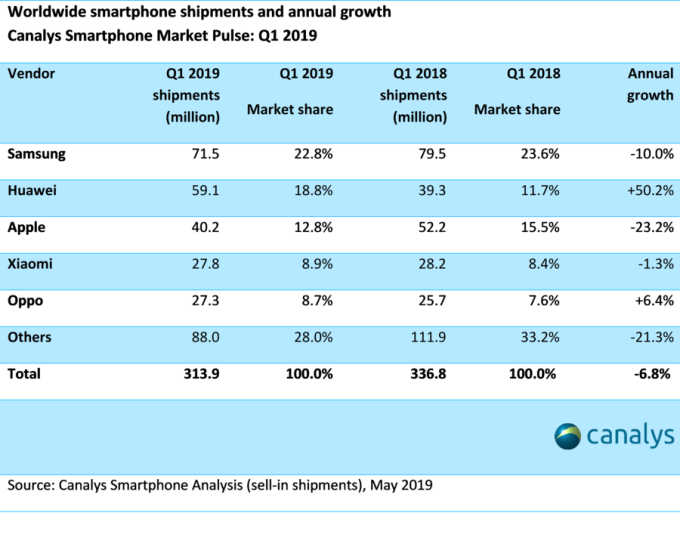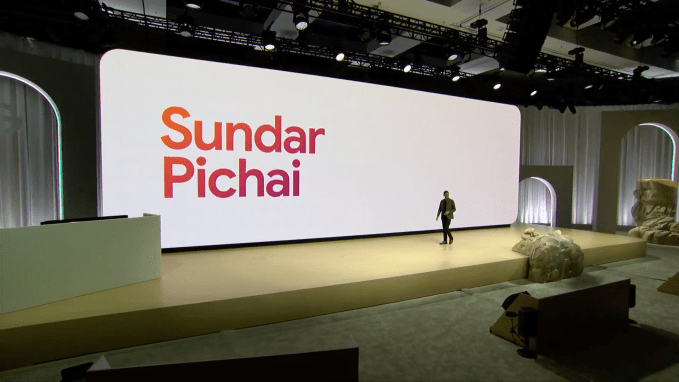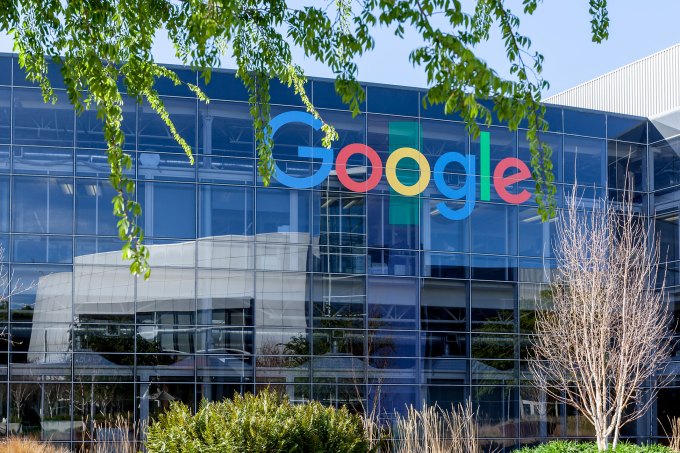After a dozen years of riding high, the iPhone is showing signs of weakness in a struggling smartphone market where Apple is still managing to be the biggest loser.
Here’s a snapshot of where things are…
Apple hasn’t been broadcasting its quarterly unit sales the past few quarters, so we’ll have to lean on external researchers, but even the rosiest portrayal from Canalys suggests that the Cupertino giant saw a 23% drop in year-over-year iPhone unit sales, selling 40.2 million iPhones in Q2 of this year compared to 52.2 million iPhones a year ago.
That egregious drop takes Apple to its lowest Q2 unit sales since 2013, though the company has been solidly bumping up the average selling price in a move that has largely been working, though iPhone revenue was down 15% year-over-year, as well.
It’s not Apple’s cross to bear alone; the broader smartphone market has been in decline, down 6.8% year-over-year, according to the same report. But the iPhone’s decline contributed to roughly half of the global market’s missing units while China’s smartphone triumvirate of Huawei, Oppo and Xiaomi managed to buoy the broader sector from diving even lower.
Huawei’s unit sales shot up more than 50%.

Apple wasn’t the only non-Chinese phone maker wallowing in misery. Google cited a rough market for smartphones after delivering disappointing earnings, while Samsung saw a 10% decline in unit sales this quarter, according to Canalys.
Shoot me tips or feedback
on Twitter @lucasmtny or email
lucas@techcrunch.com
The smartphone market has had six straight quarters of year-over-year sales declines. This was the lowest quarter of smartphone unit sales in nearly five years. Whether Apple can better perform might be a question of how they can seek to differentiate themselves in China while still managing to squeeze consistent revenues from markets where it leads.
More doom-and-gloom from my buddy Brian Heater here:
On to the cheerier topic of dead robots…

AMY OSBORNE/AFP/Getty Images
Trends of the week
Here are a few big news items from big companies, with green links to all the sweet, sweet added context.
- Zuckerberg tries again
Facebook is dead as you know it, or at least that’s what CEO Mark Zuckerberg wants you to think after his audacious relaunch of the company as a lover of privacy. The company gave its Facebook app and desktop site a major face lift and spoke at length about being better. Sitting in the audience, I couldn’t help but think that Zuckerberg was spinning for extra credit with decisions that had long been made. More from my colleague Josh Constine.
- SpaceX cops to an explosion
Elon Musk’s space company may have to push back its timeline for a manned launch after the company confirmed that its Dragon crew capsule exploded during testing. The disappointing development suggests SpaceX has some more work ahead of it before it’s ready to safely transport humans into space.
- Another dead robot
Cozmo won’t be scooting into any new homes; the startup behind the cute little robot is dead after the dissolution of a new funding round. Anki raised a staggering $182 million over the course of its life and sold 1.5 million of the curious, little wheeled bots, but now it seems to face the same lonely death as Jibo, which similarly perished a couple of months ago.
- Palantir not so nice after all
Peter Thiel’s Palantir has long held onto this very nefarious reputation as an evil company that’s working with government agencies and screwing over progressive ideals in the process. It wasn’t always super clear how true this was because it kind of seemed like Alex Karp and company was just scrambling to get private sector customers so it could justify its private valuation ahead of an IPO. Well, turns out the company is shitty after all.
- Headset hullabaloo
The VR market may be dead, but don’t tell that to the companies making VR headsets. Yes, the new headsets are still all bulky and weird but they are undoubtedly better. Oculus’ introduction of the Quest (reviewed here by me) and Rift S (review from me, again) next month might just add a little life to the dead VR dreams — and if that doesn’t work, Valve has a $1,000 option it’s now hocking.

Forward-looking statement
What’s coming up next week? Well, you can expect a bunch of Microsoft news at its Build developer conference and there will also assuredly be a lot emerging from Google I/O, where I’ll be spending a couple of days next week. Here’s what we think is coming…
“…It’s shaping up to be a biggie, too, if this week’s Google earnings call was any indication. Sundar Pichai teased out a number of upcoming offerings from the company that we can expect to see on full display at the show…”

HVEPhoto/Getty Images
GAFA Gaffes
How did the top tech companies screw up this week? This clearly needs its own section, in order of awfulness: (This week was admittedly a little light on the gaffes, but don’t be too disappointed, that’s good!)
- Googlers aren’t happy about workplace retaliation:
[Google employees are staging a sit-in to protest reported retaliation]
- Researchers studying Facebook’s ad platform aren’t getting the access they say they need:
[Facebook accused of blocking wider efforts to study its ad platform]
- Apple wades into anti-competitive criticism with latest app bans:
[Apple defends its takedown of some apps monitoring screen-time]

Horacio Villalobos//Corbis/Getty Images
Extra Crunch
Our premium subscription service roars ahead. We had a fascinating piece go up this week diving into Slack’s financial filings that discovered some discrepancies in the VC funding that was reported versus what was actually raised:
“…Given that most of the stories covering Slack derived from the company’s own announcements, you would expect that those stories and the data in the S-1 would match. In short: they do, somewhat…”
Here are some of our other top reads this week for premium subscribers — you should catch up with our full Niantic deep-dive if you haven’t already; this list is a nice primer though…
Want more TechCrunch newsletters? Sign up here.

from Apple – TechCrunch https://tcrn.ch/2J6edL1





